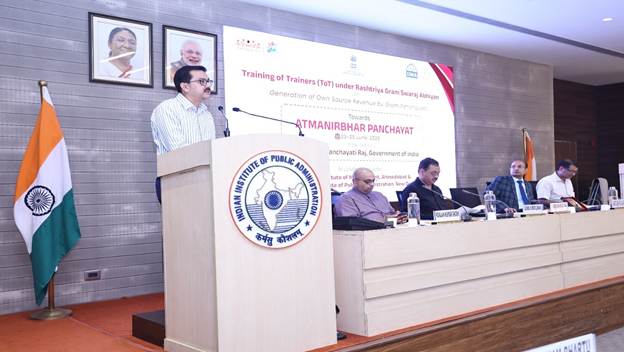The Ministry of Panchayati Raj (MoPR), under the banner of Azadi Ka Amrit Mahotsav, has launched a comprehensive Training of Trainers (ToT) programme aimed at strengthening the financial autonomy of Panchayats. The three-day programme, inaugurated today at the Indian Institute of Public Administration (IIPA), New Delhi, focuses on enhancing the capacity of Panchayats to generate their Own Source Revenue (OSR). This initiative is being implemented under the Rashtriya Gram Swaraj Abhiyan (RGSA) in collaboration with the Indian Institute of Management (IIM) Ahmedabad.
Vivek Bharadwaj, Secretary of the Ministry of Panchayati Raj, inaugurated the training session, which brought together faculty from IIM Ahmedabad, officials from IIPA, nominated Master Trainers from 16 States and Union Territories, and senior ministry officers. In his keynote address, Bharadwaj emphasized the national vision of creating Atmanirbhar Panchayats, identifying OSR as a key pillar in achieving this goal. He highlighted that the ability to raise and manage local revenues is a marker of a Panchayat’s leadership strength, public trust, and institutional maturity.
Calling the ToT a platform for transforming knowledge into actionable practices, Shri Bharadwaj encouraged participants to return to their States equipped with strategies to foster financial independence through local innovation and community engagement. He also commended IIM Ahmedabad for its role in designing a field-oriented and research-backed training module. He urged participating States and UTs to integrate the training outcomes into their systems by institutionalizing Panchayat-level revenue planning and implementing model frameworks being developed by the Ministry. He emphasized that these steps will help create a network of trained resource persons and financially conscious Panchayat functionaries, leading to resilient, accountable, and development-ready local governments.
Sushil Kumar Lohani, Additional Secretary, MoPR, elaborated on the Ministry’s broader efforts to empower Panchayats financially. He revealed that the Ministry is currently developing a Model OSR Rules framework following an in-depth review of State-level legislation. Additionally, a Digital Tax Collection Portal is in the works, designed to streamline tax collection, improve accountability, and ensure digital integration suited to local needs. Shri Lohani expressed confidence that this ToT would lay the foundation for replicating OSR capacity-building efforts throughout the Panchayati Raj system.
The training modules have been crafted by IIM Ahmedabad’s faculty to focus on practical implementation, behavioural insights, and peer learning. Key areas covered include the fundamentals of OSR, strategic revenue enhancement methods, behavioural science in tax collection, revenue utilization for village development, innovative financing mechanisms, revenue planning, and project management for effective implementation of Gram Panchayat Development Plans (GPDPs).
Addressing the gathering, Prof. Ranjan Kumar Ghosh from IIM Ahmedabad lauded the Ministry’s commitment to integrating OSR into mainstream Panchayati Raj governance. He underscored the significance of the training as a chance for participants to shift their perspective on local governance—from a compliance-driven model to one based on proactive planning, citizen involvement, and financial independence.
The session also showcased inspiring case studies from high-performing Gram Panchayats in Odisha, Gujarat, Goa, Uttar Pradesh, Maharashtra, and the Andaman & Nicobar Islands, illustrating innovative approaches to revenue generation. A total of 65 Master Trainers from 16 States and UTs are taking part in this round of training, with a second ToT scheduled for early July to cover the remaining regions. The programme is designed to have a cascading impact, with trained participants expected to support implementation and adaptation efforts at the State level.














